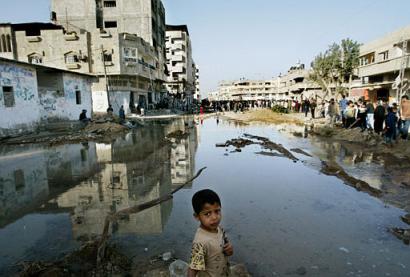The culmination of human struggle seems to be manifest in Beirut today. Chaos has been imposed on the Shia quarter and IDF missiles and bombs (more on the way from the US, doublequick) have reduced it to a smear of ash. The region is flooded with refugees and exploded cars. Does law rule here, or is this an episode of blunt circumvention? As a US citizen it is hard, if not impossible, for me to understand the Israeli perspecitve on this, for or against. Yet to hear Ehud Olmert invoke Jewish legacy as he defends the unrelenting barrage of civilian targets is something that gives me pause. This legacy is from Abraham and the promise made to Abraham that his offspring shall inherit the world. What we would seem to be witnessing now is a ruling body acting in the spirit of that promise.
Paul of Tarsus, writing to Rome, reminds the Jews of that time that it is faith rather than the law that makes those chosen by God righteous. For the promise to Abraham and his offspring that he would be heir of the world did not come through the law but through the righteousness of faith. For if it is the adherents of the law who are to be the heirs, faith is null and the promise is void. For the law brings wrath, but where there is no law there is no transgression.
With a recent nod from the Administration giving Israel one more week in which to carry out its scorched earth campaign, the rule of law is being severely tested. Yet the actors defend their actions by invoking the law and, by extension, the Abrahamic promise. How to communicate to them that they are in fact nullifying their legacy?
Tuesday, July 25, 2006
Monday, July 24, 2006
Listen to the Air Raid Sirens
The YouTube revolution keeps picking up speed. Latest is POV during missile raids in Israel, check it out: http://www.youtube.com/watch?v=kbE08G_CTuI
Sunday, July 23, 2006
Upcoming Films
 Jeffrey Overstreet is talking about new and upcoming films over at his lookingcloser.blogspot.com. Not only is this a shameless plug for his page, but it also gives me an excuse to display the poster for the film I am anticipating the most, Darren Aronofsky's long-delayed adventure epic, The Fountain.
Jeffrey Overstreet is talking about new and upcoming films over at his lookingcloser.blogspot.com. Not only is this a shameless plug for his page, but it also gives me an excuse to display the poster for the film I am anticipating the most, Darren Aronofsky's long-delayed adventure epic, The Fountain.
Revisiting the Upper Room
 The sequel to Half Life is one of my favorite games and I recently found out that the mod community has been having a blast with its engine. The above example vaults onto stage with pizzazz, though I have two complaints:
The sequel to Half Life is one of my favorite games and I recently found out that the mod community has been having a blast with its engine. The above example vaults onto stage with pizzazz, though I have two complaints: 1. Where is Gordon Freeman? Not only does he possess a stronger resemblance to Christ, but he's the lead character in the story!
2. Why not fashion a backdrop if you're going to make such a fancy table?
http://www.planethalflife.com/
Saturday, July 22, 2006
Children of Dune
 It never occurred to me that Star Wars might owe a huge debt to Frank Herbert -until today! A cohort here at ye olde cube farme passed on a link that delineates the numerous points of comparison between the Star Wars' and Dune series. For anyone with even a passing interest in either, it makes for a good read: http://www.jitterbug.com/origins/dune.html
It never occurred to me that Star Wars might owe a huge debt to Frank Herbert -until today! A cohort here at ye olde cube farme passed on a link that delineates the numerous points of comparison between the Star Wars' and Dune series. For anyone with even a passing interest in either, it makes for a good read: http://www.jitterbug.com/origins/dune.htmlI am a huge fan of the Dune books. They are without equal in science fiction literature. I am also one of those rare humans that likes David Lynch's film adaptation. With the exception of the atrocious finale, it brings Herbert's galaxy to vivid life and captures, in my opinion, each character perfectly.
 I believe that like Tolkien's ring quadrology (you have to include The Hobbit), the epic saga of Dune will survive in new and updated forms throughout human history. As we see iterations and interpretations of Shakespeare, Sophocles, Dostoevski and other giants in current forms of the arts, so too will Dune continue speaking to us generation after generation. Personally, I would pay money to see David Cronenberg take a stab at Heretics of Dune, my favorite from the series.
I believe that like Tolkien's ring quadrology (you have to include The Hobbit), the epic saga of Dune will survive in new and updated forms throughout human history. As we see iterations and interpretations of Shakespeare, Sophocles, Dostoevski and other giants in current forms of the arts, so too will Dune continue speaking to us generation after generation. Personally, I would pay money to see David Cronenberg take a stab at Heretics of Dune, my favorite from the series.
Friday, July 21, 2006
PeaceMaker
I could hardly believe it when I saw it, but when I looked again it was still there: a videogame for finding peace in the Israel-Palestine conflict. ImpactGames is developing PeaceMaker, an interactive PC strategy game intended to find ways toward a peaceful resolution between the warring sides. From the website: PeaceMaker is currently transitioning from a project at Carnegie Mellon University's Entertainment Technology Center into the first commercial title of ImpactGames... Video games are a revolutionary medium for entertainment and education. They transport players to new places and allow them to explore, experiment, and learn at their own pace. In the past, many games have dealt with conquest, war, and destruction. PeaceMaker, however, is a game for the future– a game which will teach the player that peace and cohabitation, not war and annihilation, are the real strategies worth fighting for.
From the website: PeaceMaker is currently transitioning from a project at Carnegie Mellon University's Entertainment Technology Center into the first commercial title of ImpactGames... Video games are a revolutionary medium for entertainment and education. They transport players to new places and allow them to explore, experiment, and learn at their own pace. In the past, many games have dealt with conquest, war, and destruction. PeaceMaker, however, is a game for the future– a game which will teach the player that peace and cohabitation, not war and annihilation, are the real strategies worth fighting for.
While this seems more suitable for a classroom environment, I am very excited to see how this game will appeal to PC players. It is a departure from World of Warcraft, perhaps even a necessary one!
For more information, or to join the mailing list, go here: http://www.peacemakergame.com/TheGame.htm
 From the website: PeaceMaker is currently transitioning from a project at Carnegie Mellon University's Entertainment Technology Center into the first commercial title of ImpactGames... Video games are a revolutionary medium for entertainment and education. They transport players to new places and allow them to explore, experiment, and learn at their own pace. In the past, many games have dealt with conquest, war, and destruction. PeaceMaker, however, is a game for the future– a game which will teach the player that peace and cohabitation, not war and annihilation, are the real strategies worth fighting for.
From the website: PeaceMaker is currently transitioning from a project at Carnegie Mellon University's Entertainment Technology Center into the first commercial title of ImpactGames... Video games are a revolutionary medium for entertainment and education. They transport players to new places and allow them to explore, experiment, and learn at their own pace. In the past, many games have dealt with conquest, war, and destruction. PeaceMaker, however, is a game for the future– a game which will teach the player that peace and cohabitation, not war and annihilation, are the real strategies worth fighting for. While this seems more suitable for a classroom environment, I am very excited to see how this game will appeal to PC players. It is a departure from World of Warcraft, perhaps even a necessary one!
For more information, or to join the mailing list, go here: http://www.peacemakergame.com/TheGame.htm
Sunday, July 16, 2006
Deadly Diet
When asked how Israel should deal with the new Hamas government in the occupied territories of Palestine, the senior adviser to Israel's prime minister, Dov Weisglass, answered, "The idea is to put Palestinians on a diet but not make them die of hunger." For the people living in Gaza, these words undoubtedly had the sound of a death sentence. Already suffering under poverty and unemployment before Hamas, they now are told they are going on a diet. I do not think Mr Weisglass means to improve their health. These heartless words from the government of Israel came earlier this year; anyone glancing at the news will know that the situation in Gaza is now profoundly worse than it was in January, when Hamas was democratically elected to office. A series of events since then have created a profound humanitarian crisis throughout Gaza.
These heartless words from the government of Israel came earlier this year; anyone glancing at the news will know that the situation in Gaza is now profoundly worse than it was in January, when Hamas was democratically elected to office. A series of events since then have created a profound humanitarian crisis throughout Gaza.
In his most recent op-ed, the ever reliable Alexander Cockburn describes the desperate situation. He writes, "Israel has kept shut the Karni (al-Muntar) industrial crossing into the Gaza Strip for weeks at a time, locking out medicines, food and goods... affecting the lives of at least 700,000 people. Doctors, nurses, teachers, civil servants, policemen and others return home empty-handed each day to families whose overall levels of poverty and malnutrition have grown dramatically. Save the Children UK Program Manager Jan Coffey reports that in Gaza now 78 percent of the population lives below the poverty line ($2 per day) and that 10 percent of children under five suffer from chronic malnutrition." Clearly Hamas has not improved this situation with its violent stance against the occupier. Though their leadership oscillates daily about whether or not to acknowledge Israel's right to exist, they are adamant in their demand that Israel recognise their own right to exist. This demand extends to the international community, which has responded with economic sanctions and silence in the face of devastating violence against civilians. By association, the entire world appears to have turned its back on Gaza, leaving them to perish from sheer negligence. Ehud Olmert's statement before a joint session of the US Congress a few weeks ago, in which he stated that he believes "in our people's eternal and historic right to this entire land," was met by applause and an outpouring of financial gifts, therefore aligning our government on the side of -dare I write it?- manifest destiny.
Clearly Hamas has not improved this situation with its violent stance against the occupier. Though their leadership oscillates daily about whether or not to acknowledge Israel's right to exist, they are adamant in their demand that Israel recognise their own right to exist. This demand extends to the international community, which has responded with economic sanctions and silence in the face of devastating violence against civilians. By association, the entire world appears to have turned its back on Gaza, leaving them to perish from sheer negligence. Ehud Olmert's statement before a joint session of the US Congress a few weeks ago, in which he stated that he believes "in our people's eternal and historic right to this entire land," was met by applause and an outpouring of financial gifts, therefore aligning our government on the side of -dare I write it?- manifest destiny.
Around the same time as this proclamation of intent -Olmert as much as announced his intention to eradicate the Palestinian population- the World Bank published a report in which the economic outlook for the occupied Palestinian Territories is assumed based on a scenario in which tax revenues to the Palestinian Authority are withheld, trade and labor restrictions are imposed and foreign aid reduced. Under this scenario, "real GDP per capita declines by 27 percent, and personal incomes by 30 percent -a one year contraction of economic activity equivalent to a deep depression. Unemployment hits 47 percent and poverty 74 percent by 2008."
Sadly this is no longer a scenario: it is happening in Gaza as you read this. The growing crisis is also the subject of a press release last month from the International Committee of the Red Cross: The ICRC is deeply concerned about the growing needs and the worsening security situation in the occupied territories, caused in large part by the decision earlier this year to withhold funds and other aid from the PA. The occupying power -in this case the State of Israel- is responsible for meeting the basic needs of the civilian population of the territory it occupies. Those needs include sufficient food, medical supplies and means of shelter."
The growing crisis is also the subject of a press release last month from the International Committee of the Red Cross: The ICRC is deeply concerned about the growing needs and the worsening security situation in the occupied territories, caused in large part by the decision earlier this year to withhold funds and other aid from the PA. The occupying power -in this case the State of Israel- is responsible for meeting the basic needs of the civilian population of the territory it occupies. Those needs include sufficient food, medical supplies and means of shelter."
 These heartless words from the government of Israel came earlier this year; anyone glancing at the news will know that the situation in Gaza is now profoundly worse than it was in January, when Hamas was democratically elected to office. A series of events since then have created a profound humanitarian crisis throughout Gaza.
These heartless words from the government of Israel came earlier this year; anyone glancing at the news will know that the situation in Gaza is now profoundly worse than it was in January, when Hamas was democratically elected to office. A series of events since then have created a profound humanitarian crisis throughout Gaza.In his most recent op-ed, the ever reliable Alexander Cockburn describes the desperate situation. He writes, "Israel has kept shut the Karni (al-Muntar) industrial crossing into the Gaza Strip for weeks at a time, locking out medicines, food and goods... affecting the lives of at least 700,000 people. Doctors, nurses, teachers, civil servants, policemen and others return home empty-handed each day to families whose overall levels of poverty and malnutrition have grown dramatically. Save the Children UK Program Manager Jan Coffey reports that in Gaza now 78 percent of the population lives below the poverty line ($2 per day) and that 10 percent of children under five suffer from chronic malnutrition."
 Clearly Hamas has not improved this situation with its violent stance against the occupier. Though their leadership oscillates daily about whether or not to acknowledge Israel's right to exist, they are adamant in their demand that Israel recognise their own right to exist. This demand extends to the international community, which has responded with economic sanctions and silence in the face of devastating violence against civilians. By association, the entire world appears to have turned its back on Gaza, leaving them to perish from sheer negligence. Ehud Olmert's statement before a joint session of the US Congress a few weeks ago, in which he stated that he believes "in our people's eternal and historic right to this entire land," was met by applause and an outpouring of financial gifts, therefore aligning our government on the side of -dare I write it?- manifest destiny.
Clearly Hamas has not improved this situation with its violent stance against the occupier. Though their leadership oscillates daily about whether or not to acknowledge Israel's right to exist, they are adamant in their demand that Israel recognise their own right to exist. This demand extends to the international community, which has responded with economic sanctions and silence in the face of devastating violence against civilians. By association, the entire world appears to have turned its back on Gaza, leaving them to perish from sheer negligence. Ehud Olmert's statement before a joint session of the US Congress a few weeks ago, in which he stated that he believes "in our people's eternal and historic right to this entire land," was met by applause and an outpouring of financial gifts, therefore aligning our government on the side of -dare I write it?- manifest destiny.Around the same time as this proclamation of intent -Olmert as much as announced his intention to eradicate the Palestinian population- the World Bank published a report in which the economic outlook for the occupied Palestinian Territories is assumed based on a scenario in which tax revenues to the Palestinian Authority are withheld, trade and labor restrictions are imposed and foreign aid reduced. Under this scenario, "real GDP per capita declines by 27 percent, and personal incomes by 30 percent -a one year contraction of economic activity equivalent to a deep depression. Unemployment hits 47 percent and poverty 74 percent by 2008."
Sadly this is no longer a scenario: it is happening in Gaza as you read this.
 The growing crisis is also the subject of a press release last month from the International Committee of the Red Cross: The ICRC is deeply concerned about the growing needs and the worsening security situation in the occupied territories, caused in large part by the decision earlier this year to withhold funds and other aid from the PA. The occupying power -in this case the State of Israel- is responsible for meeting the basic needs of the civilian population of the territory it occupies. Those needs include sufficient food, medical supplies and means of shelter."
The growing crisis is also the subject of a press release last month from the International Committee of the Red Cross: The ICRC is deeply concerned about the growing needs and the worsening security situation in the occupied territories, caused in large part by the decision earlier this year to withhold funds and other aid from the PA. The occupying power -in this case the State of Israel- is responsible for meeting the basic needs of the civilian population of the territory it occupies. Those needs include sufficient food, medical supplies and means of shelter."
Aspirational Retailing
I am a happy Starbucks employee. Working south of downtown Seattle in the historic, massive Sears building (it is the largest corporate building in the city, as long as two football fields), I enjoy being part of a positive enterprise. What makes it positive? Admittedly, the company's stated goal is to provide the global consumer with product for every aspect of life. Starbucks sells coffee, as every one knows, and in addition offers a certain mindset and lifestyle. Customers at the siren are not only getting caffeinated when they purchase a latte, they are buying into holistic values based on respect for farmers, the environment and the human body: this type of business model has recently been coined aspirational retailing and slowly but steadily it is catching on in the capitalist arena.
 How does Starbucks sell aspiration, you ask? In several ways, not least of which is through its leading product, the cup of joe. (Incidentally, how did coffee come to get the name "Joe"? Why not Susan, Arthur or Ringo?) Perception at the consumer level is that by purchasing a (recycled) cup with the siren on the side, we are participating directly with a way of life. This perception is hardly accidental. It has been cultivated over a period of years, as a result of guiding principles within the company geared toward better living and bigger profits. While these two ideas might seem mutually exclusive at first glance, Starbucks as well as other successful companies in the Pacific Northwest are showing the contrary to be true.
How does Starbucks sell aspiration, you ask? In several ways, not least of which is through its leading product, the cup of joe. (Incidentally, how did coffee come to get the name "Joe"? Why not Susan, Arthur or Ringo?) Perception at the consumer level is that by purchasing a (recycled) cup with the siren on the side, we are participating directly with a way of life. This perception is hardly accidental. It has been cultivated over a period of years, as a result of guiding principles within the company geared toward better living and bigger profits. While these two ideas might seem mutually exclusive at first glance, Starbucks as well as other successful companies in the Pacific Northwest are showing the contrary to be true.
John P Mackey, chief executive at Whole Foods Market, calls this fusion values-driven capitalism. Last year in an article in Reason magazine, Mr Mackey stated that he believes in a form of capitalism "that more consciously works for the common good instead of depending solely on the 'invisible hand' to generate positive results for society." With over 180 stores and $5.7 billion in sales, his idea is successful. More people are buying the organic products he sells because it would seem they want superior products in health, taste and nutrition. "The appeal of Whole Foods is that it is a place where food is celebrated," says Bill Bishop, president of a food retail consultancy, "food is romanced, food is presented in a fashion that is in opposition to how it is sold in the vast majority of supermarkets." Arguably the same could be said of another west coast staple, Trader Joe's; both companies write their ticket on brick-and-mortar values, the grassy principles of people that root themselves in sustainability and humane treatment of fauna. By the same token, Starbucks participates in aspirational retailing also, insomuch as it promotes water conservation, fidelity to small farms and healthy living.
"The appeal of Whole Foods is that it is a place where food is celebrated," says Bill Bishop, president of a food retail consultancy, "food is romanced, food is presented in a fashion that is in opposition to how it is sold in the vast majority of supermarkets." Arguably the same could be said of another west coast staple, Trader Joe's; both companies write their ticket on brick-and-mortar values, the grassy principles of people that root themselves in sustainability and humane treatment of fauna. By the same token, Starbucks participates in aspirational retailing also, insomuch as it promotes water conservation, fidelity to small farms and healthy living.
Starbucks imports the bulk of its beans from South American and African farms. Because it does not produce locally, the siren is often the target of vicious slander; not only this, but there is a perception as well that it should export sound values to the regions where it buys. To a growing extent, Starbucks is doing so. Can the same be said of Whole Foods? They import a great deal of produce from overseas. Asparagus, for example, is brought in from New Zealand. Yet the kiwi farms are hardly paradigms of sustainable agriculture, and clearly the produce, once it appears on a rack in the US, is not fresh.
Were Whole Foods customers to understand this disparity from what could be called "organic values", would they lose faith in the enterprise? Somehow I doubt it, but the question is valid. What if they knew Whole Foods is a wholly-owned subsidy of General Mills? My point is not to denigrate the company; rather I merely wish to draw a comparison with Starbucks. Both companies represent a pelagic shift in economic seas, one that aims, I think, toward positive growth. This kind of aspirational retail is quickly gaining cachet. John Heinbockel of Goldman Sachs calls Whole Foods "one of the best businesses in retail today."
At risk of stating the obvious, Starbucks is also described by Wall Street in such jubilant tones.
During the 2004 campaign season, there was a lot of talk about values and how important they are to voters when choosing who to elect. At the time I did not give this talk much credence, but it appears I should have. While the results of that season are less than ideal, we can yet depend on this manifest paradigm bringing about a good harvest. Here's hoping we continue to see the trend grow.
 How does Starbucks sell aspiration, you ask? In several ways, not least of which is through its leading product, the cup of joe. (Incidentally, how did coffee come to get the name "Joe"? Why not Susan, Arthur or Ringo?) Perception at the consumer level is that by purchasing a (recycled) cup with the siren on the side, we are participating directly with a way of life. This perception is hardly accidental. It has been cultivated over a period of years, as a result of guiding principles within the company geared toward better living and bigger profits. While these two ideas might seem mutually exclusive at first glance, Starbucks as well as other successful companies in the Pacific Northwest are showing the contrary to be true.
How does Starbucks sell aspiration, you ask? In several ways, not least of which is through its leading product, the cup of joe. (Incidentally, how did coffee come to get the name "Joe"? Why not Susan, Arthur or Ringo?) Perception at the consumer level is that by purchasing a (recycled) cup with the siren on the side, we are participating directly with a way of life. This perception is hardly accidental. It has been cultivated over a period of years, as a result of guiding principles within the company geared toward better living and bigger profits. While these two ideas might seem mutually exclusive at first glance, Starbucks as well as other successful companies in the Pacific Northwest are showing the contrary to be true.John P Mackey, chief executive at Whole Foods Market, calls this fusion values-driven capitalism. Last year in an article in Reason magazine, Mr Mackey stated that he believes in a form of capitalism "that more consciously works for the common good instead of depending solely on the 'invisible hand' to generate positive results for society." With over 180 stores and $5.7 billion in sales, his idea is successful. More people are buying the organic products he sells because it would seem they want superior products in health, taste and nutrition.
 "The appeal of Whole Foods is that it is a place where food is celebrated," says Bill Bishop, president of a food retail consultancy, "food is romanced, food is presented in a fashion that is in opposition to how it is sold in the vast majority of supermarkets." Arguably the same could be said of another west coast staple, Trader Joe's; both companies write their ticket on brick-and-mortar values, the grassy principles of people that root themselves in sustainability and humane treatment of fauna. By the same token, Starbucks participates in aspirational retailing also, insomuch as it promotes water conservation, fidelity to small farms and healthy living.
"The appeal of Whole Foods is that it is a place where food is celebrated," says Bill Bishop, president of a food retail consultancy, "food is romanced, food is presented in a fashion that is in opposition to how it is sold in the vast majority of supermarkets." Arguably the same could be said of another west coast staple, Trader Joe's; both companies write their ticket on brick-and-mortar values, the grassy principles of people that root themselves in sustainability and humane treatment of fauna. By the same token, Starbucks participates in aspirational retailing also, insomuch as it promotes water conservation, fidelity to small farms and healthy living.Starbucks imports the bulk of its beans from South American and African farms. Because it does not produce locally, the siren is often the target of vicious slander; not only this, but there is a perception as well that it should export sound values to the regions where it buys. To a growing extent, Starbucks is doing so. Can the same be said of Whole Foods? They import a great deal of produce from overseas. Asparagus, for example, is brought in from New Zealand. Yet the kiwi farms are hardly paradigms of sustainable agriculture, and clearly the produce, once it appears on a rack in the US, is not fresh.
Were Whole Foods customers to understand this disparity from what could be called "organic values", would they lose faith in the enterprise? Somehow I doubt it, but the question is valid. What if they knew Whole Foods is a wholly-owned subsidy of General Mills? My point is not to denigrate the company; rather I merely wish to draw a comparison with Starbucks. Both companies represent a pelagic shift in economic seas, one that aims, I think, toward positive growth. This kind of aspirational retail is quickly gaining cachet. John Heinbockel of Goldman Sachs calls Whole Foods "one of the best businesses in retail today."
At risk of stating the obvious, Starbucks is also described by Wall Street in such jubilant tones.
During the 2004 campaign season, there was a lot of talk about values and how important they are to voters when choosing who to elect. At the time I did not give this talk much credence, but it appears I should have. While the results of that season are less than ideal, we can yet depend on this manifest paradigm bringing about a good harvest. Here's hoping we continue to see the trend grow.
Saturday, July 15, 2006
Coupe de Boule
 Zizou's headbutt has apparently inspired a new dance hit. In an effort to raise France's spirits in the wake of an ignominious World Cup defeat, three associates at Plage Records, a small label that specialises in ad music, wrote a Caribbean zouk-influenced dance track and posted it on the 'net. Since then the song has gotten heavy airplay on the French radio station, SkyRock, as well as inciting a rights battle between record labels and ringtone sellers.
Zizou's headbutt has apparently inspired a new dance hit. In an effort to raise France's spirits in the wake of an ignominious World Cup defeat, three associates at Plage Records, a small label that specialises in ad music, wrote a Caribbean zouk-influenced dance track and posted it on the 'net. Since then the song has gotten heavy airplay on the French radio station, SkyRock, as well as inciting a rights battle between record labels and ringtone sellers.The chorus can be heard in dance clubs across Europe: "Zidane, il a tape" (Zidane, the hit man). The title -Coupe de Boule- is French for headbutt.
Check out the track for yourself: http://www.blog-football.net/tag/coupe-de-boule/
Friday, July 14, 2006
The Road to Guantanamo
 I have yet to see this film, though my interest in the topic is keen. This is a vital subject for US citizens. If ever one of us has asked how our forebears could stand by while Japanese were needlessly interred during the Second World War, this film may go some length to preventing the same thing from continuing today. At the very least it will inform and provoke, both measures by which citizens in our fine country can take stock and upon which our constitutional liberties depend.
I have yet to see this film, though my interest in the topic is keen. This is a vital subject for US citizens. If ever one of us has asked how our forebears could stand by while Japanese were needlessly interred during the Second World War, this film may go some length to preventing the same thing from continuing today. At the very least it will inform and provoke, both measures by which citizens in our fine country can take stock and upon which our constitutional liberties depend.http://www.roadtoguantanamomovie.com/
'Wide' Again
The NYTimes is consistent: second day running they headline the word wide in an awkward context, this time concerning "Wide Strikes by Hezbollah". As with yesterday's "Wide Flaws", the usage here is distracting; I would have used "regional", "retaliatory", or "relentless". Nevertheless, we are seeing Beirut bloom into a state of conflict not seen since the Three-Day War in 1967. At that time, Israel repulsed attacks at nearly every point on its borders, from Syria, Lebanon and Egypt; now Hezbollah is taking advantage of the chaos in Gaza and showing itself to be sympathetic to Hamas by performing incursions and rocket sallies from its stronghold in Beirut. In retaliation, Israeli Defense Forces have sent punishing airstrikes deep into Lebanon, disabling Beirut's international airport, and have established a naval blockade. Are we seeing the foment of war?
Nevertheless, we are seeing Beirut bloom into a state of conflict not seen since the Three-Day War in 1967. At that time, Israel repulsed attacks at nearly every point on its borders, from Syria, Lebanon and Egypt; now Hezbollah is taking advantage of the chaos in Gaza and showing itself to be sympathetic to Hamas by performing incursions and rocket sallies from its stronghold in Beirut. In retaliation, Israeli Defense Forces have sent punishing airstrikes deep into Lebanon, disabling Beirut's international airport, and have established a naval blockade. Are we seeing the foment of war?
 Nevertheless, we are seeing Beirut bloom into a state of conflict not seen since the Three-Day War in 1967. At that time, Israel repulsed attacks at nearly every point on its borders, from Syria, Lebanon and Egypt; now Hezbollah is taking advantage of the chaos in Gaza and showing itself to be sympathetic to Hamas by performing incursions and rocket sallies from its stronghold in Beirut. In retaliation, Israeli Defense Forces have sent punishing airstrikes deep into Lebanon, disabling Beirut's international airport, and have established a naval blockade. Are we seeing the foment of war?
Nevertheless, we are seeing Beirut bloom into a state of conflict not seen since the Three-Day War in 1967. At that time, Israel repulsed attacks at nearly every point on its borders, from Syria, Lebanon and Egypt; now Hezbollah is taking advantage of the chaos in Gaza and showing itself to be sympathetic to Hamas by performing incursions and rocket sallies from its stronghold in Beirut. In retaliation, Israeli Defense Forces have sent punishing airstrikes deep into Lebanon, disabling Beirut's international airport, and have established a naval blockade. Are we seeing the foment of war?
Thursday, July 13, 2006
Bye Bye War Profiteers
The Washington Post reported yesterday that the Army is ending Halliburton's exclusive, no-bid contracts in Iraq. This is tremendous news for US citizens: no longer will our taxes be going to finance shoddy, unfinished civic projects and ludicrous overbillings. Seriously, we are talking about 15 billion dollars that have gone to pay for delivering food and fuel that more often than not never showed up, and construction for housing US troops that is flimsy at best and unfinished at worst.
 The person I am happiest for is Bunnatine Greenhouse, who blew the whistle on Halliburton's profiteering and consequently lost her job because of it. In the wake of her complaints, the Pentagon actually awarded Halliburton for its performance! Meanwhile this honest, brave woman was exiled to the margins. Disgusting.
The person I am happiest for is Bunnatine Greenhouse, who blew the whistle on Halliburton's profiteering and consequently lost her job because of it. In the wake of her complaints, the Pentagon actually awarded Halliburton for its performance! Meanwhile this honest, brave woman was exiled to the margins. Disgusting.
 The person I am happiest for is Bunnatine Greenhouse, who blew the whistle on Halliburton's profiteering and consequently lost her job because of it. In the wake of her complaints, the Pentagon actually awarded Halliburton for its performance! Meanwhile this honest, brave woman was exiled to the margins. Disgusting.
The person I am happiest for is Bunnatine Greenhouse, who blew the whistle on Halliburton's profiteering and consequently lost her job because of it. In the wake of her complaints, the Pentagon actually awarded Halliburton for its performance! Meanwhile this honest, brave woman was exiled to the margins. Disgusting.
Rights for Detainees
The debate of late about detainees' fate at Gitmo has provoked a spate of boilerplate from the administration. The official line appears to be: "We are sticking by our guns."
The prevailing climate at the White House, at least as it is transmitted through the media -when is the last time I was at the White House to see how things actually are run?- is to agree with decisions by lawmakers, then to amend those decisions with an executive spin. For instance, pertaining to the recent Supreme Court decision that detainees held at Guantanamo Bay have rights consistent with international standards for civilisation, as represented by Common Article 3 in the Geneva Conventions, a statement went out that the administration stood by the Court's ruling. That was two days ago.
 Today administration lawyers are arguing that the "best solution" for Congress moving forward will be to adopt the military tribunals that the president has been pushing now for four years. In other words, Congress is free to abide by the Court's ruling... so long as it is in line with the design already laid down by the executive.
Today administration lawyers are arguing that the "best solution" for Congress moving forward will be to adopt the military tribunals that the president has been pushing now for four years. In other words, Congress is free to abide by the Court's ruling... so long as it is in line with the design already laid down by the executive.
This kind of top-down thinking does not appear to be in line with democratic values, at least so far as those established by the US constitution. The impression instead is of a ruling cabinet that dictates national policy and then waits for legal aspects to fall in place.
Is this not operating outside the law? I don't mean to ask rhetorically, but literally: is the executive making up a new form of constitional rule, one that falls outside the parametres of the constitution itself?
As you might imagine, I am following developments in this case very closely... desperately, one might say. After all, I love my country and do not wish to see it overrun by Machiavellian Mayberrianism... or anything resembling it.
The prevailing climate at the White House, at least as it is transmitted through the media -when is the last time I was at the White House to see how things actually are run?- is to agree with decisions by lawmakers, then to amend those decisions with an executive spin. For instance, pertaining to the recent Supreme Court decision that detainees held at Guantanamo Bay have rights consistent with international standards for civilisation, as represented by Common Article 3 in the Geneva Conventions, a statement went out that the administration stood by the Court's ruling. That was two days ago.
 Today administration lawyers are arguing that the "best solution" for Congress moving forward will be to adopt the military tribunals that the president has been pushing now for four years. In other words, Congress is free to abide by the Court's ruling... so long as it is in line with the design already laid down by the executive.
Today administration lawyers are arguing that the "best solution" for Congress moving forward will be to adopt the military tribunals that the president has been pushing now for four years. In other words, Congress is free to abide by the Court's ruling... so long as it is in line with the design already laid down by the executive.This kind of top-down thinking does not appear to be in line with democratic values, at least so far as those established by the US constitution. The impression instead is of a ruling cabinet that dictates national policy and then waits for legal aspects to fall in place.
Is this not operating outside the law? I don't mean to ask rhetorically, but literally: is the executive making up a new form of constitional rule, one that falls outside the parametres of the constitution itself?
As you might imagine, I am following developments in this case very closely... desperately, one might say. After all, I love my country and do not wish to see it overrun by Machiavellian Mayberrianism... or anything resembling it.
Headline Magic
This headline in today's NYTimes intrigues me: Wide Flaws Found in Boston Tunnel After Death
How can a flaw be "wide"? Now, if they had found wide claws -as if from some kind of tunnel beastie- that I could believe.
Obviously it is horrible that a woman died because of these flaws. Even so, I would expect editors at the esteemed daily would have a better command of language. Since a flaw is a diagnostic term, how can it have physical properties? Can a flaw be "immense" or "tousled"?
I would have gone a different way, describing the flaws as "endemic", "perilous", or "extensive".
How can a flaw be "wide"? Now, if they had found wide claws -as if from some kind of tunnel beastie- that I could believe.
Obviously it is horrible that a woman died because of these flaws. Even so, I would expect editors at the esteemed daily would have a better command of language. Since a flaw is a diagnostic term, how can it have physical properties? Can a flaw be "immense" or "tousled"?
I would have gone a different way, describing the flaws as "endemic", "perilous", or "extensive".
Wednesday, July 12, 2006
Summer Rain Brings Tempest in Gaza
Published on Monday, July 10, 2006 by the Boston Globe
My Life in Gaza
by Mona El-Farra
The irony is almost beyond belief. Since the capture of an Israeli soldier on June 25, the Gaza Strip has been subjected to a large-scale military operation, what Israel calls Summer Rain. Because Israel bombed the power plant, and the area needs electricity to pump water, most of Gaza now has almost no access to drinking water. In the heat of summer, rain would be a blessing far more welcome than the ongoing bombings.
I am already starting to lose track of days and nights, of how many bombs have dropped. Since the main power plant was destroyed, we have had to live with no electricity. What we do get is patchy, and barely enough to recharge our mobile phones and our laptops so that we do not lose all touch with each other and with the outside world.
 As a physician, I fear for our patients. Twenty-two hospitals have no electricity. They have to rely on generators, but the generators need fuel. We have enough fuel to last a few days at most, because the borders are sealed so no fuel can get in. The shortage of power threatens the lives of patients on life-support machines and children in intensive care, as well as renal dialysis patients and others. Hundreds of operations have been postponed. The pharmacies were already nearly empty because of Israeli border closures and the cutoff of international aid. What little supplies were left have gone bad in the absence of refrigeration.
As a physician, I fear for our patients. Twenty-two hospitals have no electricity. They have to rely on generators, but the generators need fuel. We have enough fuel to last a few days at most, because the borders are sealed so no fuel can get in. The shortage of power threatens the lives of patients on life-support machines and children in intensive care, as well as renal dialysis patients and others. Hundreds of operations have been postponed. The pharmacies were already nearly empty because of Israeli border closures and the cutoff of international aid. What little supplies were left have gone bad in the absence of refrigeration.
Food too is spoiling without refrigeration, and food supplies are low. West Bank farmers threw away truckloads of spoiled fruit after sitting for days and then being denied Israeli permission to enter Gaza. Children grow hungry as we watch the food that could nourish them thrown into the garbage instead. More than 30,000 children suffer from malnutrition, and this number will increase as diarrhea spreads because of the limited supply of clean water and food contamination.
My Life in Gaza
by Mona El-Farra
The irony is almost beyond belief. Since the capture of an Israeli soldier on June 25, the Gaza Strip has been subjected to a large-scale military operation, what Israel calls Summer Rain. Because Israel bombed the power plant, and the area needs electricity to pump water, most of Gaza now has almost no access to drinking water. In the heat of summer, rain would be a blessing far more welcome than the ongoing bombings.
I am already starting to lose track of days and nights, of how many bombs have dropped. Since the main power plant was destroyed, we have had to live with no electricity. What we do get is patchy, and barely enough to recharge our mobile phones and our laptops so that we do not lose all touch with each other and with the outside world.
 As a physician, I fear for our patients. Twenty-two hospitals have no electricity. They have to rely on generators, but the generators need fuel. We have enough fuel to last a few days at most, because the borders are sealed so no fuel can get in. The shortage of power threatens the lives of patients on life-support machines and children in intensive care, as well as renal dialysis patients and others. Hundreds of operations have been postponed. The pharmacies were already nearly empty because of Israeli border closures and the cutoff of international aid. What little supplies were left have gone bad in the absence of refrigeration.
As a physician, I fear for our patients. Twenty-two hospitals have no electricity. They have to rely on generators, but the generators need fuel. We have enough fuel to last a few days at most, because the borders are sealed so no fuel can get in. The shortage of power threatens the lives of patients on life-support machines and children in intensive care, as well as renal dialysis patients and others. Hundreds of operations have been postponed. The pharmacies were already nearly empty because of Israeli border closures and the cutoff of international aid. What little supplies were left have gone bad in the absence of refrigeration.Food too is spoiling without refrigeration, and food supplies are low. West Bank farmers threw away truckloads of spoiled fruit after sitting for days and then being denied Israeli permission to enter Gaza. Children grow hungry as we watch the food that could nourish them thrown into the garbage instead. More than 30,000 children suffer from malnutrition, and this number will increase as diarrhea spreads because of the limited supply of clean water and food contamination.
Monday, July 10, 2006
STUPIDEST MAN ON THE PLANET (updated)

PARIS (Reuters) - Zinedine Zidane said on Wednesday he was provoked into head-butting defender Marco Materazzi during the World Cup final because the Italian insulted his mother and his sister.
In an interview with French television channel Canal Plus Zidane also apologised to children and fans but did not regret the attack that led to his sending off.
"He (Materazzi) pulled my shirt several times and I told him that we could swap shirts at the end of the game if he wanted to," Zidane said in the live interview.
"He, then, pronounced very tough words about my mother and my sister. I tried not to listen to him but he kept repeating them," Zidane said.
"I knew it was my last game and I knew that there were only 10 minutes to play but things happened very swiftly," he said.
"I am a man before anything else," he added.
Zidane, widely regarded as the greatest player of his generation and playing the last game of his career, was shown a red card, leaving his team mates finish the match without him.
Zidane denied Materazzi called him an Islamic "terrorist," as was reported by a Paris-based anti-racism group.
Zidane is of Algerian origin. His parents were born in the village of Aguemone in the Kabylie region.
FIFA decided on Tuesday to open a disciplinary investigation into the incident and Sepp Blatter, head of soccer's ruling body, hinted that Zidane could be stripped of the tournament's best player award.
Sunday, July 09, 2006
Armageddon Flowchart
Got this hilarious piece of spec from http://www.fullyramblomatic.com/features/armaged.htm
(click on the image to see it full-size)

(click on the image to see it full-size)

SUDOKU!!!
O sudoku... I'm late getting "on board" with this puzzler, but it has me by the scruff. Here at the cube farm, where we cube monkeys rant and rave on behalf of Starbucks, when there is a quiet moment it is time for sudoku.

As any of my past girlfriends will attest, my powers of logic are feeble. Will solving these puzzles help to sharpen them? Is that my hope? Undecided, but decidedly a question.

As any of my past girlfriends will attest, my powers of logic are feeble. Will solving these puzzles help to sharpen them? Is that my hope? Undecided, but decidedly a question.
Saturday, July 08, 2006
Other "zeitheists"

And here I thought I was so original with my little madeup name for a blog. Google the word zeitheist and other manifestations of this syllogism pop up:
An EBay entity (in Japanese): http://feedback.tw.ebay.com/ws/eBayISAPI.dll?ViewFeedback&userid=zeitheist
My original attempt at a blog: http://zeitheist.blogspot.com/
A website by the same name: http://www.zeitheist.com/
A definition from the New York Review of Magazines:
7. ZeitHeist With Magazivo’s patented celebrity-removal feature, you can program the machine to edit all references to celebrities du jour. Don’t ever want to read about Rosie O’Donnell, Ben Affleck or Paris Hilton again? A quick hit of the “Z” button and they’re gone. Set it and forget it. It’s just that easy!
And my old LiveJournal account! Which is kind of fitting, since that site was a sort of proto-blog: http://wngl.livejournal.com/profile
...and a bottle of rum!

I emerged from the theatre three hours after going in, exhausted, panting for breath, holding my sides... and very gratified! Seeing the Pirates of the Caribbean sequel was so much fun I could barely walk afterward. There are some uproarious sequences that will keep you glued to the screen and waiting with anticipation for the next stunt, and you will cheer as Cap'n Jack Sparrow does his cartoony best to make it through yet another gauntlet of epic, Warner Brothers-esque peril. Seriously, this is the best cartoon movie in a long time! (At least since The Incredibles...)
Personally, I loved the Kraken. Ever since I was a wee lad thrilling at the Disney production of 20,000 Leagues Under the Sea, I have loved monster squids rising up from the fathoms and with a thousand tentacles pulling down helpless frigates, freighters and Flying Dutchmans. Even so, I was totally unprepared for just how monstrous this beastie could be: Cap'n Jack has a very memorable encounter that still has me laughing.
 Obviously Johnny Depp was born to play Sparrow. While he has reduced the character to a few familiar tics, he is still a joy to watch, especially when the Cap'n has to get out of a scrape. The escape sequence wherein he does his best impression of a runaway shish kabob is unforgettable. Keira Knightley is gorgeous and spunky and a great actress; she manages most of the "heavy lifing" character-wise with panache. The less said about the bland Orlando Bloom the better -though the ladies with us at the movie didn't care a whit about his performance.
Obviously Johnny Depp was born to play Sparrow. While he has reduced the character to a few familiar tics, he is still a joy to watch, especially when the Cap'n has to get out of a scrape. The escape sequence wherein he does his best impression of a runaway shish kabob is unforgettable. Keira Knightley is gorgeous and spunky and a great actress; she manages most of the "heavy lifing" character-wise with panache. The less said about the bland Orlando Bloom the better -though the ladies with us at the movie didn't care a whit about his performance. Lots of familiar characters return. My favorite was Norrington, the stiff commodore from the first movie. A scene where he is caked in mud and vomit and simply standing swaying, rum bottle in hand, is priceless. Nice to see some character evolution -or, in this case, devolution.
Bill Nighy as Davy Jones is precious. You will believe a squid has a heart. And his crew-! A bevy of mutated fishmen that are worth the price of admission. If I see this movie again (once I recover my energy), I will be watching the crew to try to figure just what exactly they are. You have never seen such a motley bunch, and I mean that as praise. One of the strengths of these movies is that the pirates really look like pirates, even when they are CGI!
Whatever you do, if you have yet to see this, avoid the cast list: seeing it in advance will spoil some of the movie's best surprises.
Subscribe to:
Posts (Atom)